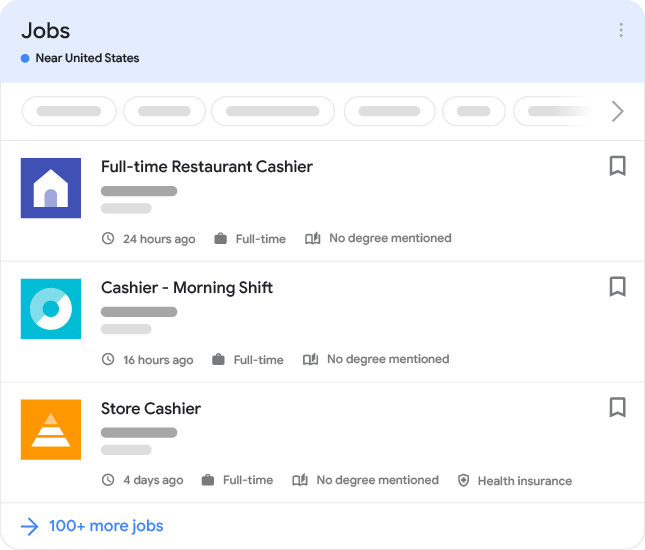Risultati di ricerca estesi
Oltre ai risultati avanzati standard, la Ricerca Google supporta una classe più interattiva ed evoluta di risultati avanzati, noti come risultati di ricerca estesi. I risultati di ricerca estesi spesso comprendono un'esperienza più coinvolgente o altre funzionalità avanzate per l'interazione. Ad esempio, di seguito viene mostrato un risultato esteso di Jobs, visualizzabile da un utente che cerca "offerte di lavoro negli Stati Uniti":

Con i risultati di ricerca estesi, gli utenti possono effettuare una ricerca tra le diverse proprietà di un elemento di dati strutturati; ad esempio, un utente potrebbe cercare ricette per una zuppa di pollo con meno di 200 calorie o ricette che prevedano un tempo di preparazione inferiore a un'ora.
Implementazione dei risultati di ricerca estesi
I risultati di ricerca estesi sono un sottogruppo di risultati avanzati e vengono implementati tramite dati strutturati. Alcuni tipi di risultati avanzati sono disponibili soltanto come risultati di ricerca estesi (ad esempio, ricette, offerte di lavoro ed eventi), mentre altri tipi di risultati avanzati possono diventare risultati estesi con l'aggiunta di alcune proprietà. La documentazione relativa a un tipo di risultato avanzato spiega se e come un risultato avanzato base può diventare un risultato di ricerca esteso.
Qui sono disponibili informazioni tecniche e una galleria di risultati.
I risultati di ricerca estesi si basano sull'algoritmo di ranking della Ricerca Google, pertanto, oltre ad aggiungere i dati strutturati corretti alle tue pagine, devi seguire le norme sulla qualità elencate di seguito per consentire a Google di indicizzare le tue pagine e definirne correttamente il ranking.
- Le norme sulla qualità dei dati strutturati
- Le nozioni di base sulla Ricerca Google
- Le norme sulla qualità dei risultati di ricerca estesi
Tipi di risultati di ricerca estesi
I seguenti tipi di risultati di ricerca supportano un'esperienza estesa:
Norme sulla qualità dei risultati di ricerca estesi
Segui queste norme relative allo spam per rendere le tue pagine idonee per i risultati di ricerca estesi. Se l'algoritmo di ranking per i risultati di ricerca estesi determina che un'ampia parte del sito non soddisfa i requisiti di qualità, potrebbe escludere l'intero sito dai risultati di ricerca estesi.
- Proprietà obbligatorie: ogni tipo di risultato di ricerca esteso definisce un gruppo di proprietà obbligatorie. Gli elementi privi delle proprietà obbligatorie non sono idonei.
- Completezza: a un maggior numero di proprietà aggiuntive (consigliate) corrisponde una più elevata qualità dell'elemento per gli utenti. Nel caso di offerte di lavoro, gli utenti preferiscono quelle che indicano la retribuzione rispetto a quelle che non lo fanno e anche il ranking dei risultati di ricerca estesi tiene in considerazione questo aspetto. Per quanto riguarda le ricette, le recensioni di utenti reali e le autentiche valutazioni a stelle sono importanti per gli utenti del tuo sito e per i risultati di ricerca estesi. La completezza è uno dei più importanti indicatori di ranking per i risultati di ricerca estesi.
- Pertinenza: i dati di cui hai eseguito il markup devono essere pertinenti per la ricerca con risultati estesi in questione. Ecco alcuni esempi di dati non pertinenti:
- Un sito di live streaming sportivo che etichetta le trasmissioni come eventi locali.
- Un sito sulla lavorazione del legno che etichetta le istruzioni come ricette.
- Pagine foglia: i risultati di ricerca estesi sono disponibili solo per le pagine foglia, non per le pagine di elenco. Una pagina foglia è una pagina che descrive le proprietà dettagliate di un articolo. Una pagina di elenco, invece, è una pagina di categoria che rimanda a più pagine foglia. Di seguito sono riportati esempi di pagine di elenco:
- Una pagina che descrive le "10 migliori idee per cucinare il tacchino" con link che rimandano alle singole ricette.
- Una pagina che elenca tutte le offerte di lavoro a Mountain View, con link alle singole offerte.
- Norme relative ai contenuti: i risultati di ricerca estesi prevedono norme aggiuntive specifiche per il tipo di contenuto in relazione a ogni tipo di dati, come descritto nella relativa documentazione. I documenti o siti che violano tali norme relative ai contenuti potrebbero ottenere un ranking meno favorevole o risultare non idonei per la funzionalità.
